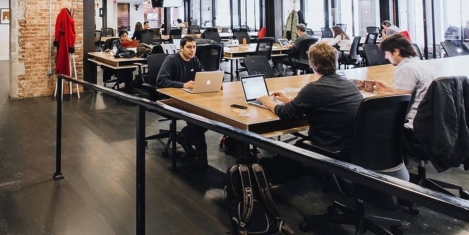June 13, 2018
UK skills shift as organisations digitise and automate operations
 Almost half (49 percent) of companies are struggling to find skilled workers as digitisation and automation cause significant change in the skills businesses look for in professionals, according to new data from Robert Half UK. As a result, one fifth (21 percent) are now looking to recruit candidates with exceptional soft skills, with a view to developing the desired technical skills on the job. In the Robert Half research, UK business leaders consider an openness to new ideas (28 percent), an openness to change (26 percent) and good communication abilities (19 percent) as key attributes and will prioritise these areas when considering new talent. Digitisation and automation are rapidly evolving the business world. Companies are having to quickly adapt to the changing world of work, and are looking for employees who can keep pace,” says Matt Weston, UK Managing Director at Robert Half.
Almost half (49 percent) of companies are struggling to find skilled workers as digitisation and automation cause significant change in the skills businesses look for in professionals, according to new data from Robert Half UK. As a result, one fifth (21 percent) are now looking to recruit candidates with exceptional soft skills, with a view to developing the desired technical skills on the job. In the Robert Half research, UK business leaders consider an openness to new ideas (28 percent), an openness to change (26 percent) and good communication abilities (19 percent) as key attributes and will prioritise these areas when considering new talent. Digitisation and automation are rapidly evolving the business world. Companies are having to quickly adapt to the changing world of work, and are looking for employees who can keep pace,” says Matt Weston, UK Managing Director at Robert Half.










 A major research study “
A major research study “
 Business Secretary Greg Clark proposed new laws in Parliament yesterday (June 11th) that new large firms will have to justify their chief executives’ salaries and reveal the gap to their average UK worker. It means that for the first time, UK listed companies with more than 250 UK employees will have to disclose and explain this difference – known as ‘pay ratios’ – every year. However, according to data published today by the Chartered Management Institute (CMI) and
Business Secretary Greg Clark proposed new laws in Parliament yesterday (June 11th) that new large firms will have to justify their chief executives’ salaries and reveal the gap to their average UK worker. It means that for the first time, UK listed companies with more than 250 UK employees will have to disclose and explain this difference – known as ‘pay ratios’ – every year. However, according to data published today by the Chartered Management Institute (CMI) and 






 The provision of flexible office space is increasing as landlords look to capitalise on its increasing demand by occupiers. Alongside this a significant proportion would be happy to work in partnership with a flexible office space provider. According to a new study; UK Landlords & Investors Embrace the Flexible Revolution from CBRE, the majority of UK landlords (92 percent) believe that flexible office space is on the brink of becoming mainstream and are not only keen to monitor but respond to the growth of flexible office space. Over three quarters (77 percent) of survey participants stated that they are currently considering some form of flexible provision, with 79 percent declaring an intention to act within the next 12 months.
The provision of flexible office space is increasing as landlords look to capitalise on its increasing demand by occupiers. Alongside this a significant proportion would be happy to work in partnership with a flexible office space provider. According to a new study; UK Landlords & Investors Embrace the Flexible Revolution from CBRE, the majority of UK landlords (92 percent) believe that flexible office space is on the brink of becoming mainstream and are not only keen to monitor but respond to the growth of flexible office space. Over three quarters (77 percent) of survey participants stated that they are currently considering some form of flexible provision, with 79 percent declaring an intention to act within the next 12 months. 











June 11, 2018
Coworking is breaking away from its cultural and geographical stereotypes
by Gary Chandler • Comment, Property, Technology, Workplace design
(more…)